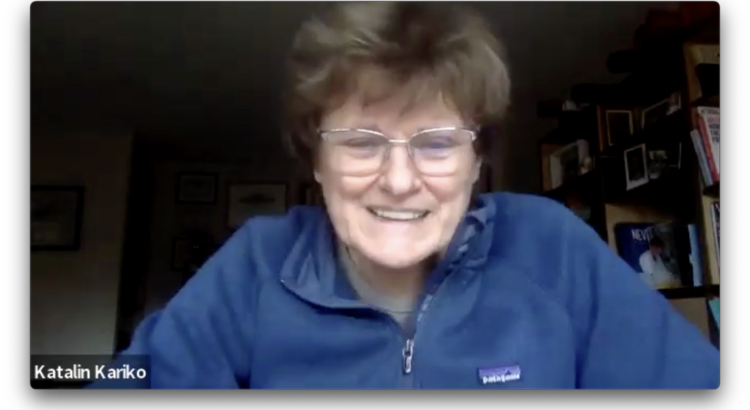Katalin Karikó received this year’s Nobel Prize for the application of mRNA techology to vaccines – she is the reason that we all don’t have to fear Covid-19 any more. In December 2022, I interviewed her for the Newsletter of Leopoldina, Germany’s national academy of sciences.
Your expertise is in messenger RNA, or mRNA. What does this molecule do?
Katalin Karikó: Messenger RNA is a molecule which is present in almost every cell of our body. It carries information from the DNA to the cell’s protein synthesis factory and tells it what to do. It’s a short-lived molecule that usually degrades quickly – you can find dinosaur DNA but not dinosaur mRNA.
Today we know that if you can manipulate mRNA you can get a cell to make almost any protein. But when you started out you had problems getting people excited about that.
Karikó: In 1990 the Human Genome Project started, so everybody was working with DNA. And when I said for most of the people you don’t need to change their genes permanently, sometimes you just need to make some molecule for a therapy, people didn’t see that and felt sorry for me.
You even got demoted by your employer, the University of Pennsylvania?
Karikó: You are never bringing in money, they said. Now they wouldn’t say that.
When did you get in contact with BioN-Tech, the German biotech company?
Karikó: I met the founder, Uğur Şahin, in the summer of 2013 when I gave a lecture in Mainz/Germany. And he offered me the position of vice president.
What kind of applications did you work on at BioNTech?
Karikó: We were interested in treating
ancer patients. My first project was to develop a method to inject mRNA into tumors in order to attract immune cells that would attack that tumor. Not really a vaccination, but a way to mobilize an immune reaction.
Did you think that this would be applied in patients any time soon?
Karikó: Every scientist wants to see their work benefitting somebody sooner or later. But I didn’t know if I would live long enough to see that.
That changed when BioNTech got together with Pfizer to develop an mRNA based flu vaccine.
Karikó: Yes, and in January 2020 while we were working on that Uğur Şahin read about a virus that infected people in China. And he thought immediately that some people who were infected but not sick would spread it across the globe.
How much work was it to adapt your mRNA technology to that new virus?
Karikó: If I had the tools here I could do that in ten minutes. The spike protein of the virus had already been published, so it was easy. It is unbelievable how flexible and how quick this method is.
The rest is history. How did you get your Covid shot?
Karikó: I had been stuck in Philadelphia since the outbreak of the pandemic, so in December 2020 the University of Pennsylvania organized a public event where my collaborator Drew Weissman and I received our shot in front of the cameras.
Why did you leave BioNTech last year?
Karikó: I had originally planned to be there for two years, then it turned out to be nine. And now I give many talks and receive awards. In the past I sometimes attended lectures of a famous scientist that was not really up to date about the literature – I don‘t want to be like that. So reading is one of my main jobs.
Do you also give talks to young people?
Karikó: When I received the Gairdner Award in Canada last year there were 300 high school students. We have to inspire this next generation, less and less people want to be in science. We have to tell them it’s hard work, but it’s like detective work – when you find the solution of the puzzle it’s so exciting. It’s not about being in the spotlight.
What does it mean for you to be part of Leopoldina?
Karikó: I read about the history of the Academy, all these outstanding scientists, and I thought: oh my god, now I belong to this group of highly esteemed people. That touches you.
